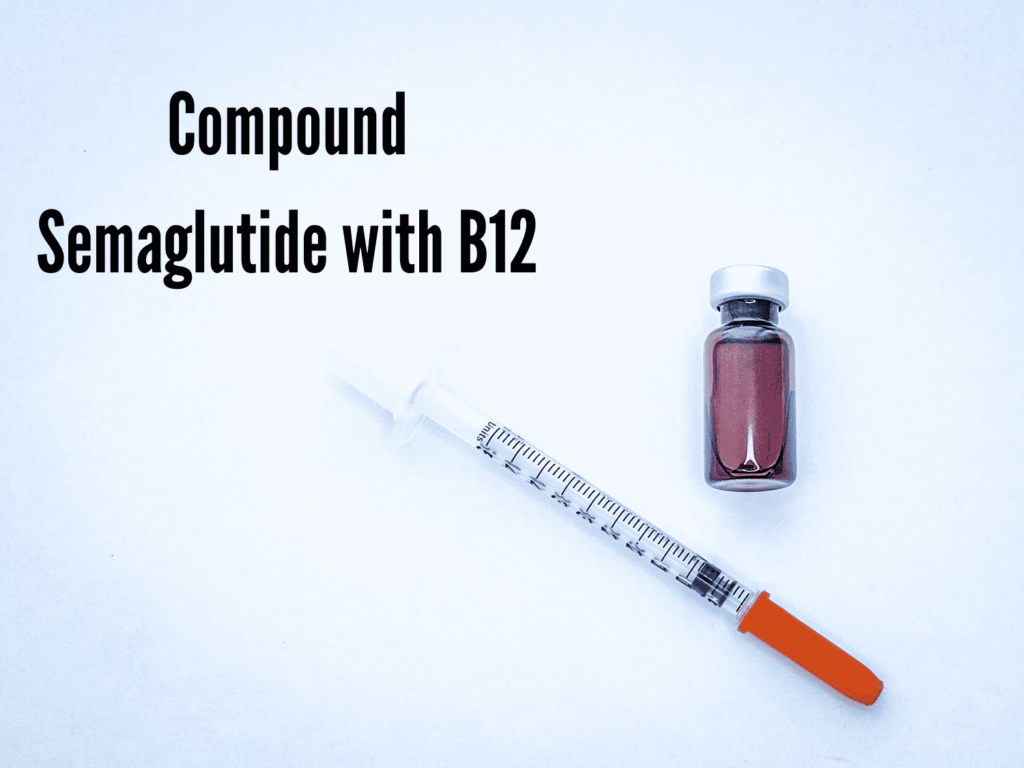Compound Semaglutide with B12: A Comprehensive Guide

In the evolving landscape of medical treatments, compound semaglutide with B12 is emerging as a promising therapeutic option.
This combination leverages the strengths of semaglutide, a potent GLP-1 receptor agonist, with the benefits of vitamin B12, an essential nutrient.
Together, they offer a range of health benefits that can address a variety of medical conditions. In this comprehensive guide, we will explore what compound semaglutide with B12 is, its benefits, uses, and why it is gaining traction in the medical community.
Table of Contents
ToggleWhat is Semaglutide?
Semaglutide is a glucagon-like peptide-1 (GLP-1) receptor agonist primarily used for the treatment of type 2 diabetes and obesity. It works by mimicking the functions of the GLP-1 hormone, which helps regulate blood sugar levels, promotes insulin secretion, and reduce appetite. Semaglutide has been shown to lead to significant weight loss and improved glycemic control in clinical trials.
What is Vitamin B12?
Vitamin B12 is an essential nutrient that plays a critical role in brain function and the production of DNA and red blood cells.
It’s commonly found in meat, fish, and dairy products, and is often supplemented in diets to ensure adequate levels.
Benefits of Combining Semaglutide with B12
When combined, semaglutide and B12 have the potential to provide even greater benefits for individuals with Type 2 diabetes. Some of these potential benefits may include:
- Improved blood sugar control: As mentioned, both semaglutide and B12 have been shown to improve insulin sensitivity. By working together, they can provide even better blood sugar control than when used separately.
- Weight loss: Semaglutide has been found to promote weight loss, and studies have also shown that B12 supplementation may aid in weight management. Combining these two medications may help individuals with Type 2 diabetes achieve and maintain a healthy weight.
- Cardiovascular benefits: Both semaglutide and B12 have been linked to improved cardiovascular health. By combining them, researchers hope to see even greater benefits in terms of reducing the risk of heart disease and stroke.

How to Use Compound Semaglutide with B12
It’s crucial to follow medical guidance when using compound semaglutide with B12. Here are some general steps:
- Consultation: Speak with your healthcare provider to determine if this combination is suitable for your health needs.
- Dosage: Follow the prescribed dosage instructions. This may involve weekly injections of semaglutide and regular B12 supplementation.
- Monitoring: Regularly monitor blood sugar levels and overall health to ensure the treatment is effective and adjust dosages if necessary.
- Diet and Lifestyle: Complement the treatment with a balanced diet and regular exercise to maximize the benefits.
Why Combine Semaglutide with Vitamin B12?
The combination of semaglutide with vitamin B12 offers a synergistic effect, enhancing the benefits of each component. Here are some key reasons why this combination is gaining popularity:
Enhanced Weight Loss
While semaglutide effectively reduces appetite and promotes weight loss, adding vitamin B12 can boost energy levels, making it easier for patients to engage in physical activity. This combination can lead to more sustainable weight loss.
Improved Glycemic Control
Semaglutide’s ability to regulate blood sugar levels is complemented by vitamin B12’s role in maintaining overall health. This enhances the efficacy of diabetes management, making it easier for patients to achieve and maintain target blood sugar levels.
Neurological Benefits
Vitamin B12 supports neurological health, which is crucial for patients managing chronic conditions like diabetes. This combination ensures that patients not only manage their blood sugar levels but also maintain optimal neurological function.
Potential Side Effects
As with any medication, the combination of semaglutide with B12 may come with potential side effects. It is crucial for individuals to be aware of these possible reactions to make informed decisions about their treatment options.
Common side effects associated with semaglutide include nausea, vomiting, diarrhea, and abdominal pain. Generally, these symptoms are mild and tend to decrease over time as the body adjusts to the medication.
Vitamin B12 supplementation is typically well-tolerated, but some individuals may experience mild side effects such as dizziness, headache, anxiety, or an upset stomach.
When semaglutide and B12 are combined, the potential for compounded side effects exists, although current studies suggest that the combination is generally well-tolerated.
Conclusion
Compound semaglutide with B12 represents a significant advancement in the treatment of type 2 diabetes, obesity, and overall health management.
By combining the potent effects of semaglutide with the essential benefits of vitamin B12, this combination offers a comprehensive approach to improving patient outcomes. As always, it’s essential to consult with healthcare providers to determine the best treatment plan tailored to individual needs.
FAQ:
What is the best way to take this combination?
The best way to take this combination is under the guidance of a healthcare provider. Typically, semaglutide is injected weekly, while B12 can be administered via injection, oral supplements, or nasal sprays.
Can this combination help with weight loss?
Yes, this combination has been shown to aid in weight loss, especially when combined with a healthy diet and regular exercise.
Are there any dietary restrictions?
There are no specific dietary restrictions, but maintaining a balanced diet can enhance the benefits of the treatment.
How long before I see results?
Results can vary, but many patients begin to notice improvements in energy levels and weight loss within a few weeks to a few months.
Is this combination safe for everyone?
While generally safe, this combination may not be suitable for everyone. It’s important to discuss your medical history and any current medications with your healthcare provider before starting treatment.





